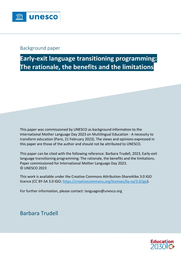Early-exit language transitioning programming: the rationale, the benefits and the limitations; background paper

Issues of language choice in formal education contexts are highly relevant to successful learning outcomes. The choice of a language of instruction (LoI) that the learners understand and speak is well recognized as one determiner of inclusive and equitable education, and as a key component of accomplishing both Sustainable Development Goal 4 and the Global Education 2030 Agenda.
In multilingual nations across the global South, the early-exit language transition model is the most common national MLE policy choice. This paper examines the benefits, limitations and possibilities of early-exit language transition programming across the world, with particular focus on its implementation in countries of Africa, Asia and Latin America.
In multilingual nations across the global South, the early-exit language transition model is the most common national MLE policy choice. This paper examines the benefits, limitations and possibilities of early-exit language transition programming across the world, with particular focus on its implementation in countries of Africa, Asia and Latin America.
Year:
Organisation:
UNESCO
Keywords:
languages, inclusion in education, multilingual education, inclusive education systems
Marginalized & Vulnerable group:
All
Topic:
Language of Instruction
Level of Education:
Across the education sector
Type of Resources:
Research & Policy Papers
Country/Region:
All, Africa, Arab States, Asia & the Pacific, Europe & North America, Latin America & the Caribbean
Language of Publication:
English